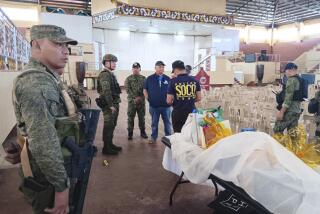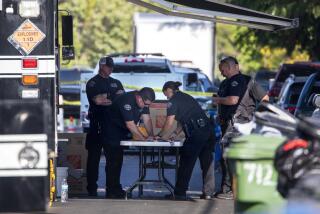Bomb Maker Gunned Down in Philippines
- Share via
ZAMBOANGA CITY, Philippines — A leading Jemaah Islamiah bomb maker who walked out of his Manila jail cell three months ago was gunned down Sunday evening in a shootout with police in the southern Philippines, authorities said.
Fathur Rohman Al Ghozi, an Indonesian terrorist who admitted carrying out bombings that killed 24 people in the Philippines and Indonesia, was killed after the car he was riding in tried to evade soldiers on a highway near the town of Pigcauayan. Authorities said the body’s fingerprints matched those of Al Ghozi taken when he was arrested last year.
“The death of Ghozi signals that terrorists will never get far in the Philippines,” President Gloria Macapagal Arroyo said in a statement.
“We are determined to end this transnational threat decisively.”
The shooting of Al Ghozi, 33, ended an embarrassing episode for the Philippine government and eliminated one of the region’s most dangerous terrorists six days before President Bush was scheduled to arrive in Manila for a brief visit.
Authorities have been concerned that Al Ghozi was planning new terror attacks while on the run. Security will be extremely tight for the Bush visit.
Special police tracking teams and thousands of troops had been hunting for Al Ghozi since his July 14 escape with two cellmates belonging to the Abu Sayyaf rebel kidnapping gang. One of the escapees, Merang Abante, also known as Omar Opik Lasal, was arrested Friday and may have provided information that helped lead police to Al Ghozi.
Authorities said they received a tip that Al Ghozi was traveling by jeep near Pigcauayan. About 7:30 p.m. Sunday, Al Ghozi approached a military checkpoint that had been set up in the area.
Al Ghozi was with two armed escorts who were on motorcycles, authorities said. When the vehicles were ordered to halt, they rammed through the roadblock. Government forces engaged them in a gun battle during a pursuit.
Authorities said the troops cornered Al Ghozi and shot him as he attempted to detonate a hand grenade. His companions escaped, according to one official who asked not to be identified. Al Ghozi was taken to a nearby clinic but died en route.
“There are big and small wounds and he was shot seven times, probably from a distance because there were no traces of powder burns on the chest,” said Dr. Vivencio Jumampo.
Al Ghozi was one of the most skilled bomb makers belonging to Jemaah Islamiah, a regional terror network closely associated with Al Qaeda. Also known as Mike the Bomb Maker, he trained at Al Qaeda camps in Afghanistan and operated in at least four Southeast Asian countries.
At the time of his arrest in January 2002, he was accumulating 21 tons of explosives for seven truck bombs that were to be used in suicide attacks on Western embassies and other targets in Singapore, authorities say.
During interrogation, he admitted that he helped organize and carry out near-simultaneous bombings that killed 22 people in Manila in December 2000.
He also admitted detonating a car bomb in August 2000 at the Philippine ambassador’s residence in Jakarta, which seriously wounded the ambassador and killed two others. At least five others who took part in the bombing were Jemaah Islamiah members who subsequently helped stage the Bali nightclub bombings that killed 202 people a year ago.
Al Ghozi was a key link between several militant groups. In addition to his ties with Jemaah Islamiah and Al Qaeda, he trained terrorists from all over the Islamic world in bomb-making at a camp in the southern Philippines run by the Moro Islamic Liberation Front, a rebel group seeking independence for the southern Philippines.
The son of an Islamic militant, Al Ghozi attended the Al Mukmin boarding school in central Java that was co-founded by extremist Indonesian cleric Abu Bakar Bashir, the alleged spiritual leader of Jemaah Islamiah who was recently sentenced to four years in prison for treason.
Al Ghozi also was closely associated with Riduan Isamuddin, also known as Hambali, a top Al Qaeda operative and Jemaah Islamiah leader who was arrested in August in Thailand.
Al Ghozi was arrested in the Philippines as he was preparing to fly to Bangkok for a summit of Jemaah Islamiah leaders. At the meeting, the group began planning the Bali bombing.
In Manila, Al Ghozi was sentenced to at least 15 years in prison for possession of explosives and obtaining false passports. He faced further charges for the Manila attack.
In July, Al Ghozi humiliated the government when he escaped from the jail at Camp Crame, the national police headquarters in Manila.
Security was so lax that Al Ghozi and his two cellmates, Abante and Abdulmukim Ong Edris, were able to pry their cell bars loose from the wall, walk past guards and slip off the base unnoticed.
They were aided in their escape by a fellow terror suspect, Abu Ali, who had earlier helped Al Ghozi procure explosives.
He later admitted buying a cell phone for Al Ghozi and providing him with crucial information for his escape. On the day before his well-planned departure, Al Ghozi arranged for the jail to call in a barber to give him a haircut and shave his beard.
As members of the Abu Sayyaf gang, Abante and Edris were allegedly involved in the high-profile kidnapping of Americans, including two hostages who were subsequently killed.
Edris was arrested in August. Authorities say he was leading troops to Al Ghozi’s hide-out when he attempted to grab a rifle from one of his escorts and was killed by other soldiers.
*
Times staff writer Paddock reported from Jakarta, Indonesia, and special correspondent Jacinto from Zamboanga City.
More to Read
Sign up for Essential California
The most important California stories and recommendations in your inbox every morning.
You may occasionally receive promotional content from the Los Angeles Times.












